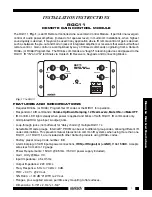
MICROPROCESSOR-BASED/DDC FUNDAMENTALS
134
ENGINEERING MANUAL OF AUTOMATIC CONTROL
BACKGROUND
COMPUTER BASED CONTROL
Computer based control systems have been available as an
alternative to conventional pneumatic and electronic systems
since the mid 1960s. Early installations required a central
mainframe or minicomputer as the digital processing unit. They
were expensive, and application was limited to larger buildings.
Reliability was also an issue since loss of the central computer
meant loss of the entire control system. Advances in
microtechnology, particularly in large scale integration (LSI),
provided answers to both the cost and reliability issues.
Introduction of microprocessors, i.e., a computer on a chip,
and high-density memories reduced costs and package size
dramatically and increased application flexibility (Fig. 1).
Microprocessor programs include all the arithmetic, logic, and
control elements of larger computers, thus providing computing
power at a cost/performance ratio suitable for application to
individual air handlers, heat pumps, VAV terminal units, or the
entire equipment room. Microprocessor-based controllers allow
digital control to be distributed at the zone level, equipment
room level, or they can control an entire building.
A more detailed definition is provided in the ASHRAE 1995
HVAC Applications Handbook. “A digital controller can be
either single- or multi-loop. Interface hardware allows the digital
computer to process signals from various input devices, such
as the electronic temperature, humidity, and pressure sensors
described in the section on Sensors. Based on the digitized
equivalents of the voltage or current signals produced by the
inputs, the control software calculates the required state of the
output devices, such as valve and damper actuators and fan
starters. The output devices are then moved to the calculated
position via interface hardware, which converts the digital signal
from the computer to the analog voltage or current required to
position the actuator or energize a relay."
In each of these definitions the key element for DDC is
digital computation. The microprocessor unit (MPU) in the
controller provides the computation. Therefore, the term digital
in DDC refers to digital processing of data and not that
HVAC sensor inputs or control outputs from the controller are
necessarily in digital format. Nearly all sensor inputs are analog
and most output devices are also analog. In order to accept
signals from these I/O devices, A/D and D/A converters are
included in the microprocessor-based controller. Figure 2
shows several inputs and outputs. The microprocessor usually
performs several control functions.
A/D
CONVERTER
MICROPROCESSOR
UNIT
INPUT
ANALOG
SENSORS
VALUE
TIME
ON
OFF
C2415
VALUE
TIME
BINARY
REPRESENTATION
OF VALUES
ANALOG
OUTPUTS
CONTROL
OUTPUT
D/A
CONVERTER
Fig. 2. Analog Functions of a Digital Controller.
LSI
TECHNOLOGY
• MICROPROCESSOR
• HIGH DENSITY
MEMORY
LOW COST
PER
FUNCTION
DISTRIBUTED
DIGITAL CONTROL
C2419
Fig. 1. Evolution of Distributed Digital Control.
DIRECT DIGITAL CONTROL
Inherent in microprocessor-based controllers is the ability to
perform direct digital control. DDC is used in place of
conventional pneumatic or electronic local control loops. There
are several industry accepted definitions of DDC. DDC can be
defined as “a control loop in which a digital controller
periodically updates a process as a function of a set of measured
control variables and a given set of control algorithms”.
ADVANTAGES
Digital control offers many advantages. Some of the more
important advantages are discussed in the following.
LOWER COST PER FUNCTION
In general, microprocessor and memory costs keep coming
down while inherent functionality keeps going up. Compared
to earlier systems, physical size of the controller is also
reduced while the number of discrete functions is increased.
Digital control, using a microcomputer-based controller,
allows more sophisticated and energy efficient control
sequences to be applied at a lower cost than with non-digital
controls; however, simple applications might be less costly
with non-digital controls.
APPLICATION FLEXIBILITY
Since microprocessor-based controllers are software based,
application flexibility is an inherent feature. A wide variety of
HVAC functions can be programmed and, in addition, the
controller can perform energy management, indoor air quality
Summary of Contents for AUTOMATIC CONTROL SI Edition
Page 1: ...AUTOMATIC CONTROL for ENGINEERING MANUAL of COMMERCIAL BUILDINGS SI Edition ...
Page 4: ...ENGINEERING MANUAL OF AUTOMATIC CONTROL iv ...
Page 6: ...ENGINEERING MANUAL OF AUTOMATIC CONTROL vi ...
Page 46: ...ENGINEERING MANUAL OF AUTOMATIC CONTROL CONTROL FUNDAMENTALS 36 ...
Page 66: ...ENGINEERING MANUAL OF AUTOMATIC CONTROL PSYCHROMETRIC CHART FUNDAMENTALS 56 ...
Page 128: ...ENGINEERING MANUAL OF AUTOMATIC CONTROL ELECTRIC CONTROL FUNDAMENTALS 118 ...
Page 158: ...MICROPROCESSOR BASED DDC FUNDAMENTALS 148 ENGINEERING MANUAL OF AUTOMATIC CONTROL ...
Page 208: ...ENGINEERING MANUAL OF AUTOMATIC CONTROL BUILDING MANAGEMENT SYSTEM FUNDAMENTALS 198 ...
Page 493: ...INDEX ENGINEERING MANUAL OF AUTOMATIC CONTROL 483 INDEX ...
Page 506: ...ENGINEERING MANUAL OF AUTOMATIC CONTROL INDEX 496 NOTES ...
Page 507: ...INDEX ENGINEERING MANUAL OF AUTOMATIC CONTROL 497 NOTES ...
Page 508: ...ENGINEERING MANUAL OF AUTOMATIC CONTROL INDEX 498 NOTES ...
Page 509: ...INDEX ENGINEERING MANUAL OF AUTOMATIC CONTROL 499 NOTES ...
Page 510: ...ENGINEERING MANUAL OF AUTOMATIC CONTROL INDEX 500 NOTES ...
Page 511: ...INDEX ENGINEERING MANUAL OF AUTOMATIC CONTROL 501 NOTES ...
Page 512: ...ENGINEERING MANUAL OF AUTOMATIC CONTROL INDEX 502 NOTES ...
















































